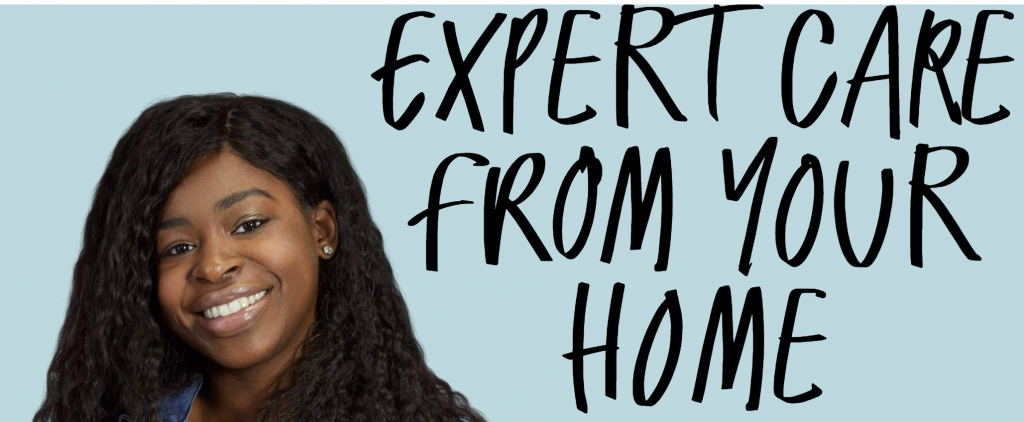
Nurx, a telehealth site for women, offers health care via telephone and the internet. (Source: Nurx.com)
Good News Arrives for Patients from Health Care Industry Adapting to COVID Crisis
Techrepublic.com reporter Veronica Combs points out several new advances and tools health care providers will taking advantage of this year in an upbeat story on the changing face of health care in America—despite the ongoing scourge of COVID-19.
In fact, Combs writes that the pandemic “accomplished what entrepreneurs, doctors, and activists couldn’t: Designing a healthcare system that works for patients instead of providers and health insurance companies.”
The industry hadn’t become “patient-centered” in spite of promises, but now it must. According to Ian McCrae, CEO of Orion Health, the long-overdue transformation of the healthcare system will be a move to “patient-centric” health.
“There will be a dramatic shift in health IT spend away from large, monolithic hospital upgrades, towards digital front doors into healthcare,” McCrae said.
This means better data sharing, a universal rollout of a COVID-19 vaccine, operationalized machine learning, and more options for mental healthcare. Here are three of her seven predictions for how technology will shape healthcare in 2021.
The COVID-19 vaccine
Researchers went from sequencing the genome of the SARS-CoV-2 (COVID-19) virus to developing a vaccine in less than a year. There are three vaccines available. The UK has approved a vaccine developed by Pfizer and BioNTech. Moderna’s RNA-based vaccine is estimated to be more than 94% effective at preventing COVID-19, based on an analysis of 95 cases in a phase III trial.
Researchers from Astra Zeneca and the University of Oxford reported that their treatment was 70% effective based on early analysis of phase III trial data. The analysis found that lower doses of the vaccine may be more effective.
The challenge now is distributing the vaccine.
Continued Demand For Telemedicine
In 2020, many barriers to telemedicine were finally torn down, after decades of work from entrepreneurs and physicians. The new demands imposed by COVID-19 provided the motivation to solve regulatory and infrastructure demands that had previously been insurmountable.
Danish Nagda, founder and CEO of Rezilient Health, said that changes in reimbursement policies reduced a lot of friction associated with getting telehealth up and running. The need to keep seeing patients during the pandemic lockdowns had a financial motivation also.
“Throughout the lockdown in many states, in-person clinical care, which represents a large source of revenue for healthcare providers, was deemed ‘nonessential,’ ” he said. “So, if a healthcare provider wanted to capture even a portion of this lost revenue, telehealth was no longer optional, they had to adopt telemedicine.”
Varsha Rao, CEO of Nurx, a digital health practice for women, said she expects to see continued high usage of her telehealth service for select areas of care as patients realize the quality and convenience of telehealth and have developed the habits of using it. Her company treats patients for contraception, sexual health, STI testing, dermatology, mental health, diabetes, high cholesterol, and hypertension, according to Rao.
Integrating Machine Learning and AI
Art Papier, CEO and co-founder, VisualDx, said that 2020 marked a real turning point for AI in healthcare, using basic chatbots and symptom screeners in the early months of the pandemic. These tools have increased the overall acceptance of AI which will fuel the adoption of more advanced AI in 2021, Papier said.
“Specifically, physicians will leverage mature diagnostic tools in the exam room to overcome a range of challenges that impede fast, accurate decision-making: racial bias embedded in our healthcare system, the need to discern COVID symptoms from other diseases within the differential diagnosis, and more,” he said.
Stefan Behrens, CEO and co-founder of GYANT, said that AI tools that streamline virtual care and extend on-demand services became a necessity.
“The healthcare industry is inundated with point solutions and we have seen an added emphasis on integrations recently to bring these disparate pieces together,” he said.
Brian Colburn, SVP of corporate development and strategy at Alegeus, said that AI can help guide employees through the process of signing up for health insurance.
“Employers can’t continue to have unrealistic expectations that consumers will figure things out on their own,” he said. “We need to stop thinking about fitting consumers into the healthcare system, and instead morph the system to solve for the consumer.”
The article highlights the importance of 5G and wifi connectivity for health care programs, patient monitoring and data sharing, as well as plans to expand mental health care using neurofeedback tech for anxiety and PTSD.
read more at techrepublic.com







Leave A Comment